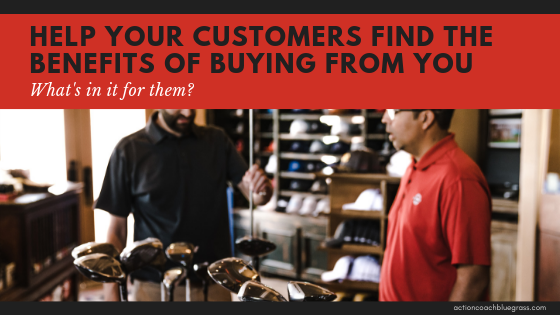[et_pb_section fb_built=”1″ _builder_version=”3.22″][et_pb_row _builder_version=”3.25″ background_size=”initial” background_position=”top_left” background_repeat=”repeat”][et_pb_column type=”4_4″ _builder_version=”3.25″ custom_padding=”|||” custom_padding__hover=”|||”][et_pb_text _builder_version=”4.4.2″ background_size=”initial” background_position=”top_left” background_repeat=”repeat”]
One of the most common issues I find in the marketing strategies of high-end (higher quality, higher price) businesses is the tendency to talk about the features of their products and services. While this issue is particularly common in technology, I see it in construction, medical, HVAC, and just about every other industry as well. The problem with this approach is that Features are all about you, your company, and your product, while your customers are far more interested in the Benefits they receive when they buy your product.
Every business owner I have ever met is proud of what they have created, whether it is a product, service or combination of the two. They often speak proudly of the features they have created for the benefit of their patients/customers/clients, yet they miss the opportunity to attract more customers by making the features the focal point of their marketing communications. When you are standing in front of a prospect, either literally or virtually in your online store, the thought going through their head is commonly called WIIFM – What’s In It For Me?
When you focus on the features of your products and services, what you are really doing is focusing on yourself, and what it is you think you do that is so important to the world. What your prospects are looking and listening for is evidence that you have been thinking about them, and that your business makes their life better in some way by providing them with meaningful benefits. Here are two of the most common traps and some suggestions for avoiding them.
Overuse of industry jargon – The biggest problems with jargon are that everyone uses it and not everyone outside the industry truly understands it. When you use jargon, you make yourself appear like a “me too” business, using the same language that everyone else does. Me too businesses can’t charge a premium, and most often get stuck competing on price, as their customers don’t appreciate (understand) the value your features provide.
Overuse of details – Business owners are often quite proud of what they have done, and often communicate what they do with long lists of detailed features and useless (from a consumer perspective) facts, some obvious and some not so obvious. Marketing your business with a list of features misses out on the opportunity to achieve what marketing is all about – educating your potential new customers on what you do for them.
The good news is that the fix for these mistakes is fairly simple 2 Step Process.
Step 1 is to read through all of your communications and ask yourself “So What?” about every single feature of your services. If you can’t come up with a compelling answer to a simple question about your features, then you can remove them from your marketing. The simple question is: Why should I care about that?
Step 2 is to rephrase every statement you make about your products to be customer/user centered. You must help your customer find their unmet needs satisfied by your marketing to help them become buying customers instead of distant prospects. One of the easiest ways to do this is to use the word “you” or “your”, or some variation of these.
It is easy to get overly excited about what you do, and the temptation is to want to tell your customers all about it. While a few might care (your family maybe), what most of your customers really want to know if how your product benefits them, so be sure to always put yourself in their shoes. Remember that your marketing isn’t for you – it’s for them.
Author: Mark McNulty, Business Coach in Louisville, KY
[/et_pb_text][/et_pb_column][/et_pb_row][/et_pb_section]

